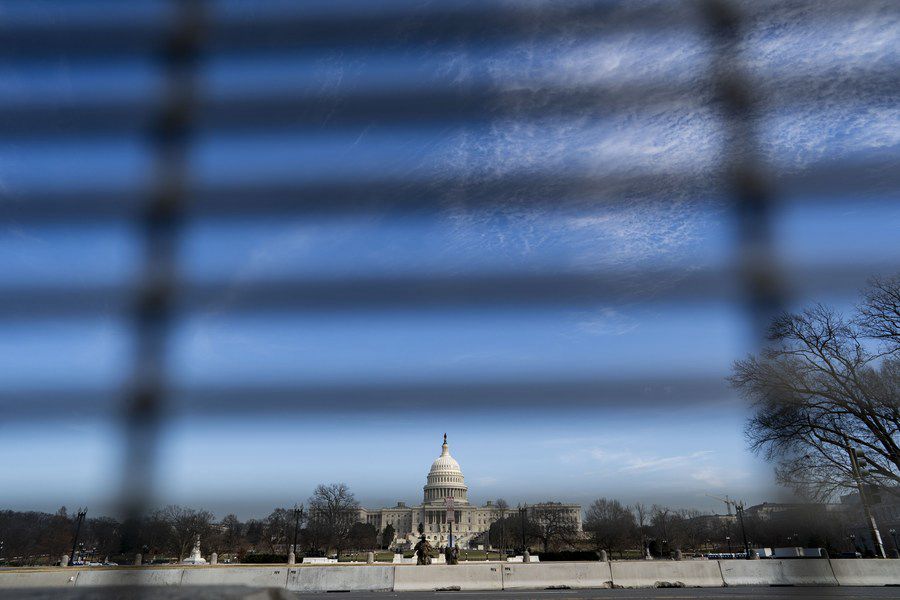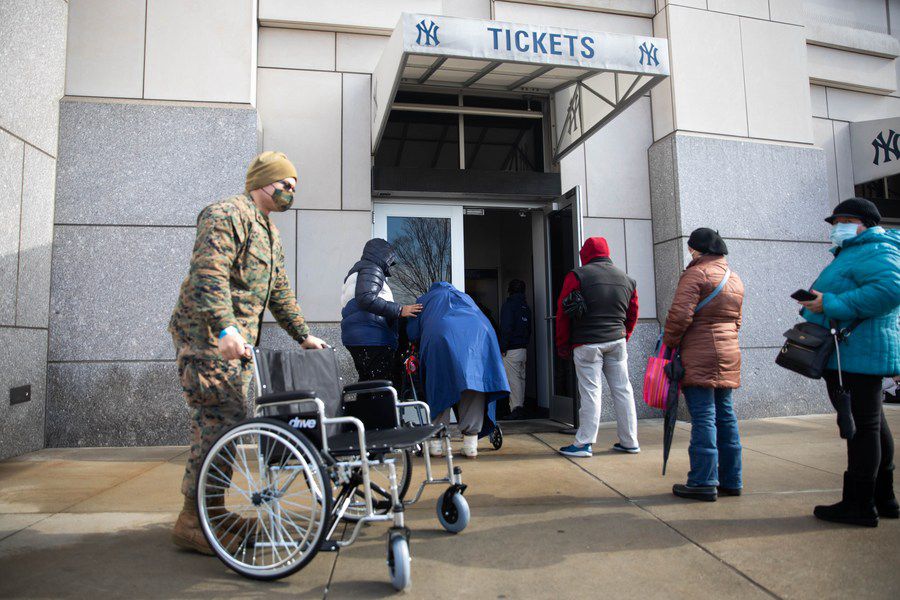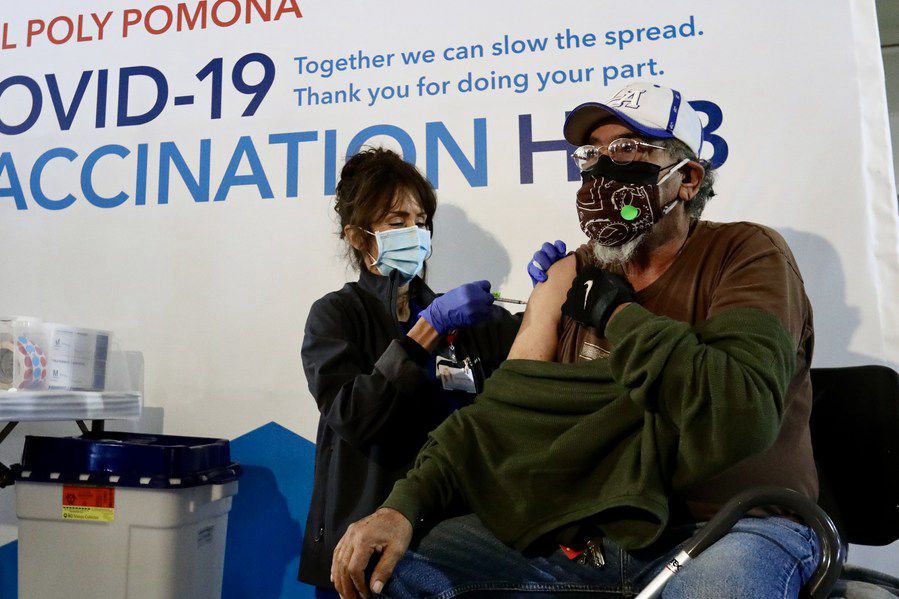


Photo taken on Jan. 12, 2021 shows the White House in Washington, D.C., the United States. (Xinhua/Liu Jie)
"Taking this crisis seriously means spending money wisely -- especially when we're borrowing it from those too young to have a vote," says Committee for a Responsible Federal Budget, a nonpartisan watchdog group.
U.S. President Joe Biden has repeatedly defended his 1.9-trillion-U.S.-dollar relief package, calling it necessary to help rein in a raging pandemic and bail out a ravaged economy, but the giant aid plan has raised eyebrows.
Republican lawmakers, who stand for a much smaller COVID-19 relief, have lashed out at Democrats' move to pass a procedural step that would allow them to push through the big bill in Congress without Republican support, calling it a partisan process.
Economists, meanwhile, voiced concerns about inflation risks and the ballooning deficit, noting that long-term economic challenges lie ahead, and that more investment in infrastructure and elsewhere would be vital for the country's future economic growth.

Photo taken on Feb. 9, 2021 shows the U.S. Capitol building in Washington, D.C., the United States. (Xinhua/Liu Jie)
"PARTISAN PROCESS"
Last week, the two Democrat-controlled chambers of Congress approved a budget resolution, which came as a key step to facilitate the relief deal's passage on Democrats' own terms, and a move Republicans considered the opposite of bipartisanship.
Michael Burgess, a Republican congressman from Texas, said it has been "disappointing" that Democrats are using a "partisan process" to pass a major bailout, just days after Biden called for unity in his inauguration speech.
"President Biden's call for unity was a simple talking point and instead of working with House GOP and Senate GOP. Democrats are pushing forward a partisan agenda that doesn't represent all Americans," Burgess tweeted.
In contrast, Biden said Friday that what Republicans have proposed is "either to do nothing or not enough."
"If I have to choose between getting help right now to Americans who are hurting so badly, and being bogged down in a monthly negotiation or compromising on a bill that's up to the crisis, it's an easy choice," said the U.S. president.
In December 2020, Congress approved a 900-billion-dollar COVID-19 relief package, following months of deadlock over the deal's size and scope, but Democrats argued that it failed to go far enough to address the crisis.
Commenting on the reservations from some Republican senators, White House economic adviser Brian Deese in January said Congress had waited for months before taking action, and that a lot of what the 900-billion bill had been doing was "filling a hole" in the second half of 2020 that desperately needed to be filled.
"This is not an issue of Congress acting too much; it's an issue of not acting enough," Deese said. "Without decisive action, we risk falling into a very serious economic hole, even more serious than the crisis we find ourselves in."
In a letter to colleagues on Friday, House Speaker Nancy Pelosi said Democrats sought to finish their work by the end of February, setting an ambitious timeline for the bill's congressional approval. The weekly 300-dollar federal unemployment benefit as part of the 900-billion relief package is set to expire in mid-March.

People wait in line to enter the mass vaccination site at Yankee Stadium in the Bronx borough of New York, the United States, Feb. 5, 2021. (Photo by Michael Nagle/Xinhua)
TOO BIG?
In recent speeches, Biden has repeatedly reflected on his time as vice president during the Obama administration which rolled out an 800-billion-dollar rescue package in 2009, saying the smaller-than-needed package to some degree impeded the recovery.
"It wasn't quite big enough. It stemmed the crisis, but the recovery could have been faster and even bigger," the U.S. president said Friday. "Today, we need an answer that meets the challenge of this crisis, not one that falls short."
In his recent opinion on The Washington Post, however, former U.S. Treasury Secretary Lawrence Summers argued that while the Obama stimulus was about half as large as the output shortfall, the proposed Biden one is three times as large as the projected shortfall.
Biden's rescue plan includes more than 400 billion dollars to directly combat the pandemic, roughly 1 trillion in direct relief to households, and more than 400 billion for hard-hit small businesses and communities.
It contains direct payments of 1,400 dollars per person for working families, which is on top of the 600-dollar check in the 900-billion relief. It would also boost federal unemployment benefits to 400 dollars per week and extend the measure through the end of September.
In normal times, Summers noted, a family of four with a pretax income of 1,000 dollars a week would take home about 22,000 dollars over the next six months, while under the Biden bill, if the breadwinner were laid off, the family's income over the same period would likely exceed 30,000 dollars.
"Judged relative to either the macroeconomic output gap or declines in family incomes, the proposed COVID-19 relief package appears very large," said Summers, treasury secretary for former U.S. President Bill Clinton and economic adviser to former President Barack Obama.
Calling the relief plan "admirably ambitious," Summers cautioned that it also brings big risks, including the possibility of setting off inflationary pressures of a kind "we have not seen in a generation," with consequences for the value of the dollar and financial stability.
To the contrary, White House Council of Economic Advisers member Jared Bernstein on Friday quoted Fed Chair Jerome Powell as saying that he is more concerned about falling short of a complete recovery than about the possibility of high inflation.
"So, this is risk management. This is balancing risks," said Bernstein. "And in our view, the risks of doing too little are far greater than the risks of doing too much."

A health care worker administers a dose of COVID-19 vaccine to a recipient at a new vaccination site in the California Polytechnic State University in Pomona, Los Angeles County, California, the United States, Feb. 5, 2021.(Xinhua)
LONG-TERM CHALLENGES
Amid widespread COVID-19 shutdowns in March and April last year, 22 million Americans lost their jobs. Despite some improvement, the U.S. labor market has seen its recovery stalled in recent months amid surging COVID-19 cases.
U.S. employers added just 49,000 jobs this January, after slashing a downwardly revised 227,000 jobs in December, according to a monthly employment report by the Labor Department. Biden said the latest data showed over 10 million people remain out of work.
U.S. Treasury Secretary Janet Yellen said Sunday that the country could return to full employment in 2022 if it enacts Biden's relief bill, citing an analysis from the Congressional Budget Office that showed the unemployment rate would stay elevated for years to come without additional support.
Commenting on the 1.9-trillion relief plan, Jeffrey Sachs, economics professor at Columbia University and senior United Nations advisor, told Xinhua via email that it is a "bold program" to control the pandemic and reflate the economy.
"If the vaccine distribution and public health measures are well carried out, and if the new viral variants do not disrupt the suppression of the epidemic, the policy measures would lead to a very robust recovery in the second half of 2021," Sachs said.
Nonetheless, he said the United States will need more "fundamental policy changes" to address long term needs: infrastructure, climate change, innovation and inequality. "That long-term recovery package still lies ahead," said the renowned economist.
In the Washington Post article, Summers said that if Biden's bill is enacted, Congress will have committed 15 percent of the gross domestic product with essentially no increase in public investment to address such challenges as economic injustice and slow growth.
Committee for a Responsible Federal Budget, a Washington, D.C.-based nonpartisan watchdog group, said in a Wednesday statement that "borrowing is not free and comes with risks," urging elected officials to be "good stewards" of the money they borrow.
"Politicians should not be taking advantage of this opportunity to buy off voters, pursue their long-term policy agenda, test the limits of the economy, or set up a series of future budget showdowns," the group said.
"Taking this crisis seriously means spending money wisely -- especially when we're borrowing it from those too young to have a vote," it added.

 Award-winning photos show poverty reduction achievements in NE China's Jilin province
Award-winning photos show poverty reduction achievements in NE China's Jilin province People dance to greet advent of New Year in Ameiqituo Town, Guizhou
People dance to greet advent of New Year in Ameiqituo Town, Guizhou Fire brigade in Shanghai holds group wedding
Fire brigade in Shanghai holds group wedding Tourists enjoy ice sculptures in Datan Town, north China
Tourists enjoy ice sculptures in Datan Town, north China Sunset scenery of Dayan Pagoda in Xi'an
Sunset scenery of Dayan Pagoda in Xi'an Tourists have fun at scenic spot in Nanlong Town, NW China
Tourists have fun at scenic spot in Nanlong Town, NW China Harbin attracts tourists by making best use of ice in winter
Harbin attracts tourists by making best use of ice in winter In pics: FIS Alpine Ski Women's World Cup Slalom
In pics: FIS Alpine Ski Women's World Cup Slalom Black-necked cranes rest at reservoir in Lhunzhub County, Lhasa
Black-necked cranes rest at reservoir in Lhunzhub County, Lhasa China's FAST telescope will be available to foreign scientists in April
China's FAST telescope will be available to foreign scientists in April